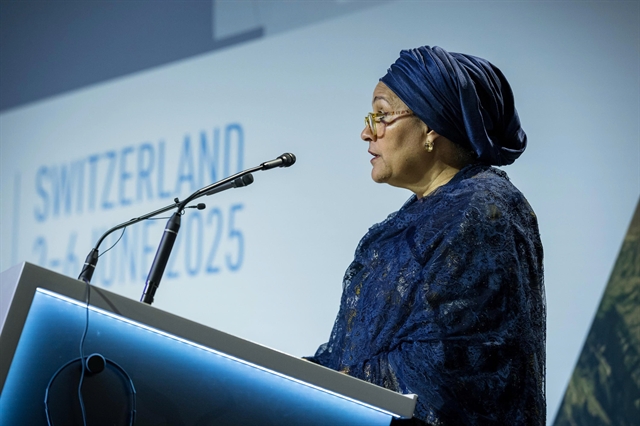 Politics & Law
Politics & Law


|
| UN Deputy Secretary-General Amina J. Mohammed speaks at the event. — Photo courtesy of the UNDRR |
GENEVA — More than 4,500 experts from around the world gathered in Geneva, Switzerland, for the Global Platform for Disaster Risk Reduction (GP2025).
The five-day event, ended on Friday, was co-organised by the United Nations Office for Disaster Risk Reduction (UNDRR) and the Government of Switzerland.
It came with just five years left to meet the commitments set out in the Sendai Framework 2015–2030.
With the theme “Every day counts, act for resilience today”, GP2025 highlights the urgency to accelerate action to reduce disaster risks and strengthen community resilience, while promoting the commitments realisation set out in the Sendai Framework.
Through four high-level dialogues, two special sessions, three plenary sessions, three ministerial roundtables and 15 thematic sessions, the platform focused on assessing the progress of the Sendai Framework and identifying current challenges as well as immediate and long-term solutions.
In her opening remarks, UN Deputy Secretary-General Amina J. Mohammed stressed the importance of accelerating action to prevent and reduce disaster risks.
Every day counted, and action today was key to building a sustainable and resilient future against the challenges of natural disasters, she said.
She confirmed that we could not wait. Action must be taken now to protect communities and the environment from inevitable disasters.
The UN Deputy Secretary-General believes that risks and disasters do not stop at the borders of any country.
Implementing the Sendai Framework and promoting disaster risk reduction initiatives requires the active participation of all stakeholders, especially countries and communities vulnerable to natural disasters.
At the ministerial roundtable, Deputy Minister of Agriculture and Environment of Việt Nam, Nguyễn Hoàng Hiệp, said, “Việt Nam has been severely affected by natural disasters in recent years, especially the Typhoon Yagi in 2024, which caused damage of up to 0.7 per cent of GDP. Given that reality, dispersing the financial burden and ensuring resources for post-disaster reconstruction work became an urgent priority.”
Deputy Minister Hiệp made two important proposals for action.
They are to promote investment in disaster-resilient infrastructure and to push up stronger international cooperation, especially in sharing resources and experiences, to help vulnerable countries enhance their response capacity.
This year's forum also featured many in-depth discussions on new and emerging topics, including pre-disaster and post-disaster data, disaster recovery and financial initiatives for the sector.
At the discussion session “Data and finance and the impact on migration due to natural disasters”, the lesson of people proactively preparing and actively participating in overcoming the super typhoon Yagi’s consequences last year in Việt Nam attracted attention of many international delegates.
Hoàng Phương Thảo, Head of ActionAid International in Việt Nam, said about the initiatives that ActionAid had conducted to support people in disaster-affected areas through technology.
“The use of technology, especially smartphones, helped vulnerable communities not only receive early warnings but also sent accurate data on the damage caused by natural disasters, thereby supporting the Government and concerned parties to provide timely and targeted financial support, ensuring that no one is left behind,” said Thảo.
Along with Việt Nam, sharing from Fiji, the Philippines and Colombia at the discussion session received much attention.
Cantol Pondja, Secretary General of the Mozambique Association of People with Disabilities affirmed, “Your experience showed us that data collection and management is not just a technical process. It must be done fairly as well as respect the rights and coping capacity of vulnerable groups.” — VNS